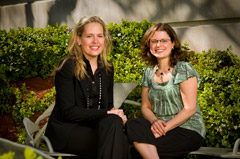Targeting a newer breast cancer subtype
Lori McCrindle was 29 when she first noticed an uncomfortable lump in her armpit. An ultrasound was inconclusive and, because she was nursing her young son, the thinking was that it might be inflammation associated with breastfeeding.
She was shocked, then, when a biopsy a few months later provided a diagnosis of locally advanced triple-negative breast cancer.
A newer breast cancer subtype, triple-negative breast cancer is characterized by its lack of "receptors" or proteins that live in or on cells and bind to something in the body to cause the cells to react. This type of cancer is estrogen receptor-negative, progesterone receptor-negative, and human epidermal growth factor receptor 2 (HER2) negative.
Treatments that target these receptors are not effective with triple-negative breast cancer. Instead, chemotherapy has proven to be the most effective treatment. Because these tumours may grow quickly, early-stage, aggressive treatment is also key.
Lori, a Toronto occupational therapist, was referred to Dr. Rebecca Dent, medical oncologist, Breast Cancer Care Team, Odette Cancer Centre, who specializes in triple-negative. "It's a more aggressive form of breast cancer. Of all cancers, it has the highest rate of relapse, but paradoxically it derives the most benefit from early stage treatment," says Dr. Dent, a University of Toronto assistant professor of medical oncology.
Dr. Dent is leading pivotal research to better understand the biology, behaviour, risk factors, and recurrence risk factors for triple-negative. At the Odette Cancer Centre she is involved in clinical trials specifically targeted to triple-negative. With colleagues she is exploring novel treatment approaches, such as chemotherapy and radiotherapy before surgery, as well as blood vessel-blocking drugs. "We're trying to find the Achilles' heel," she says. "There are likely problems in repairing DNA, so a lot of new targets are looking at targeting DNA."
Dr. Dent recommended Lori for aggressive treatment. She had months of chemotherapy, followed by surgery and radiation. As a participant in clinical trials, she received chemotherapy more frequently - every two weeks instead of every three - since data suggest greater frequency might be more effective. She also had more frequent biopsies and MRIs.
The treatment resulted in a complete clinical response. "You can't really ask for anything more...it was the right doctor, the right clinical trial, the right therapy, and my body agreed to all that," says Lori. "Sunnybrook has literally saved my life."
Now past the first three years when relapse is most likely for triple-negative cases, the data suggests Lori is less likely to have a recurrence in the future. Happily, the treatment also did not preclude having a second child -her son was born in February 2010.
Contributed by Gillian Wansbrough. Excerpted from the 2010 Cancer Research and Innovation Report, Sunnybrook's Odette Cancer Centre.



